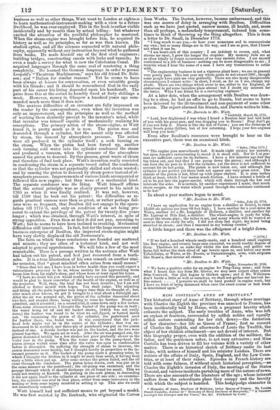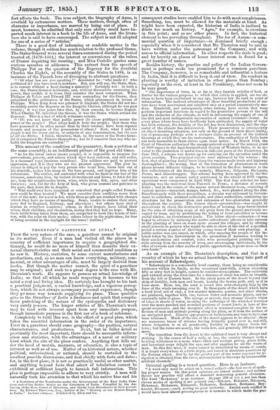MISS COSTELLO'S ANNE OF BRITTANY. * THE historical story of Anne
of Brittany, through whose marriage with Charles the Eighth the province was annexed to France, has been incidentally told by Hume, with a pregnant brevity which exhausts the subject. The early troubles of Anne, who was left an orphan at fourteen, surrounded by selfish nobles and equally selfish suitors contending for her rich dowry—the formation of her character—her life as Queen of France, first as consort of Charles the Eighth, and afterwards of Louis the Twelfth, the object of her childish attachment—are not devoid of interest. But this biography proper, even with the addition of the milliner' the tailor, and the gentleman usher, is not very extensive ; and Miss Costello has been driven to fill her volume with a variety of other matter. There is an historical sketch of Brittany under its last Duke, with notices of himself and his minister Landais. There are notices of the affairs of Italy, Spain England, and the Low Coun- tries, or at least of their rulers. Spain, in French history are told with some fulness, if without much historical perception,—as Charles the Eighth's invasion of Italy, the meetings of the States General, and various incidents partaking more of the nature of news. There are also accounts of the literature of the age ; whose interest suffers from the subordinate place they occupy and the brevity with which the subject is handled. This hodgepodge character in • Memoirs of Anne, Duchess of Brittany, twice Queen of France. By Louisa Stuart Costello, Author of" Memoirs of Mary Duchess of Burgundy," "A Summer amongst the Bocages and the Vines," &c. &c. Published by Cash.
fact affects the book. The true subject, the biography of Anne, is overlaid by extraneous matters. These matters, though often of character or importance, are marred by being out of place. It must, however, be admitted that only rare ability could have im- parted much interest in a book to the life of Anne, and the litera- ture she is said to have encouraged. The subject is not ill adapted for one of a series of "articles."
There is a good deal of informing or readable matter in the volume, though it seldom has much relation to the professed theme. The States General were several times summoned during the period treated of, (1476-1514,) the interest or convenience of the rulers of France requiring the meeting; and Miss Costello quotes some curious speeches or addresses. This extract from the speech of Philippe Pot on the question of the Regency for the youthful Charles the Eighth, at the assembly of the States in 1484, is an instance of the French love of diverging to abstract questions.
"'Of what law are you speaking ?' demanded he : who made it? who published it? you have read it nowhere. But, v will say, the State, then, is to remain without a bead during a minority? Certainly not: in such a case, the States General deliberate, and, without themselves exercising the power, they confide it to those they consider the most competent. When Philippe de Valois and Edward III. were contending for the Crown, they submitted to the arbitration of the States, which pronounced in favour of Philippe. When King Jean was prisoner in England, the States did not iIII- mediately confer the Regency on the Dauphin Charles, although he was past twenty; it was two years later that, by their consent, he became Regent. When Charles VI. inherited the throne, it was the States which settled the Regency. This is a fact of which witnesses remain. " Do you not know that public power (la chose publique) means the power of the people ? That kings hold it from the people ; that those who have possessed it by other means than by their consent, have been reputed tyrants and usurpers of the possessions of others ? Now, what I call the people is not the lower orders, or subjects of any denomination, but the seen of all the States. I think, therefore, that, in the name of the States Gene- ral is comprised the Princes themselves; nor do I conceive that any who in- habit the kingdom are excluded.' "
This account of the condition of the peasantry, from a petition of the same assembly, is an indifferent picture of the good old times.
"As for the lower orders (menu peuple), it is impossible to imagine the persecutions, poverty, and misery which they have su&red, and still suffer, in a thousand ways emaintes manieres). The soldiers are paid to prevent oppression, and it is they who are the greatest oppressors. The poor la- bourer is obliged to pay the very person who beats him' turns him out of his domicile, makes him sleep on the bare ground, and deprives him of his subsistence. The soldier, not contented with what he finds in the hut of the labourer, constrains hire, by violent ill-treatment and blows, to fetch for his use, from the neighbouring town, wine, white bread, fish, spice, and other luxuties; and, but for the help of God, who gives counsel and patience to the poor, they must die in despair. " Who could ever have imagined or conceived that people called French- men could be thus treated ? We must consider their condition worse than that of the serf; for a serf is fed, while these people are crushed with charges which they have no means of meeting. Some, unable to endure their state, have fled to England, Brittany, and elsewhere ; but others have died of famine in countless numbers; others, in their despair, have killed their wives, their children and themselves, seeing that they had no hope. Many, their cattle being taken from them, are compelled to work like beasts of bur- den, with the yoke on their necks; others labour in the night-time, for fear of being arrested in the daylight for the taxes ! (tallies.)"



































 Previous page
Previous page